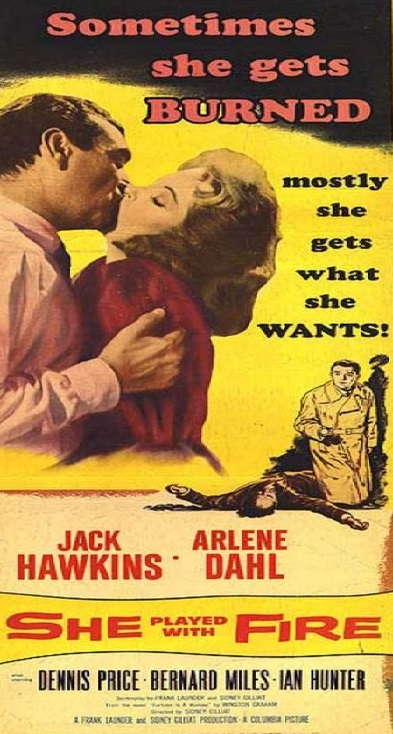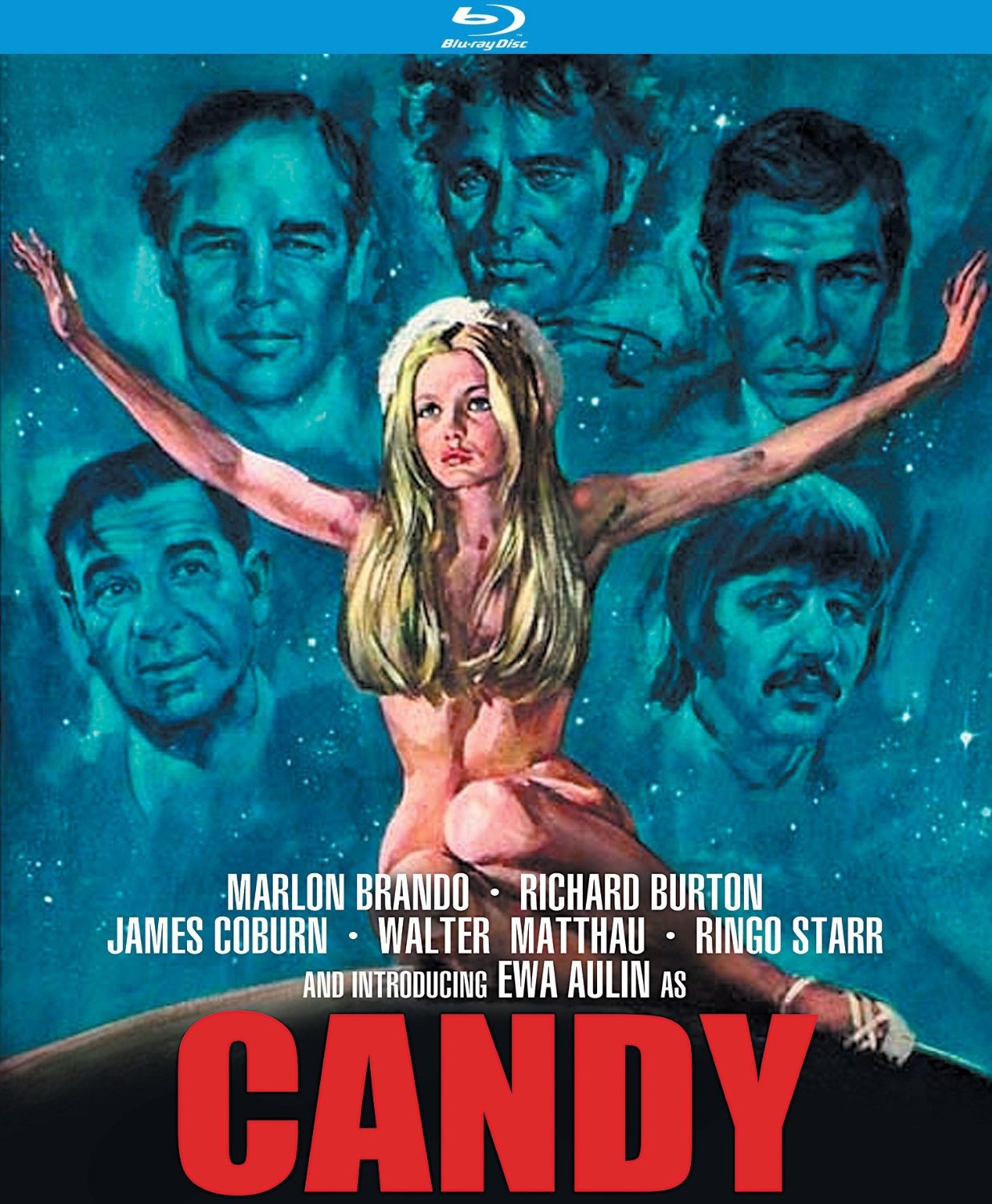The third (and apparently final) compilation of Columbia Film Noir is another highly enjoyable offering from Kit Parker and Mill Creek, with stellar transfers and a nice assortment of cinematic offerings that cover both American and British productions, big stars and young ‘uns, and sometimes no stars at all. Both the best film of all 27 offered in the three Noir Archive collections is here, and so is the worst. How's that for variety?
Noir Archive Vol. 3 covers a transition point in the history of Columbia Pictures; television had established itself in the 1950s as a “free” alternative to gathering the family to head out to the picture show, and studios fought back with things you couldn’t get at home: Technicolor, CinemaScope, 3D, and dramas that stretched the limit of what the Hays Office would normally allow. On the whole, it was a good and successful decade for Columbia; their offerings included such Oscar® winners and audience favorites as On the Waterfront, Bridge on the River Kwai, From Here to Eternity, Born Yesterday, and The Caine Mutiny. Augmenting these million-dollar hits, of course, were a litany of low budget crime dramas that kept Columbia product on the screen and profitable, either as stand-alone features for neighborhood theatres or, more often, as half of a double-bill. The death of Jack Cohn in 1956 and his brother Harry in 1958 dropped the curtain on the last of the great Hollywood moguls, however, and Columbia would never be the same.
Once again, the third Noir Archive offers the films in chronological order. All are in B&W.
The Shadow on the Window (1956) Dir. William Asher (74 min., 1.85:1) The set begins on a high note with the rarely screened but highly entertaining Shadow on the Window, from the director of the Beach Party movies! Betty Garrett(!) is being held captive by a trio of not-so-juvenile delinquents, including John Drew Barrymore. Her young son (Jerry Mathers!) knows where she is, but he’s in shock and can’t lead the police there – not even his father, who’s estranged from mom. There, that’s enough drama for anybody, right? Phil Carey is the dad, but it’s really the Beaver’s show, and a good one.
The Long Haul (1957) Dir. Ken Hughes (89 min. / 1.85:1) Hollywood worked out a deal with various British production companies; in exchange for partial financing of the films and providing one or more (usually minor) American stars, studios got domestic distribution rights. Because the British government partially subsidized films made in the UK with local crew, a buck (or pound) went much further in England than in the U.S. This is a superior drama, with trucker Victor Mature crossing fists with mobsters and getting chummy with England’s #1 sexpot Diana Dors, girlfriend of one of the gangsters, when they’re forced to take it on the lam through Scotland.
Pickup Alley (1957) Dir. John Gilling (92 min. / 2.35:1) This British offering is of special interest to film fans: it’s from the production company of Albert “Cubby” Broccoli, an American who’d moved to England to make films in the new system (and who’d strike gold a few years later, of course, by obtaining the rights to Ian Fleming’s James Bond novels). Mature is back as an American G-Man after British drug traffickers led by Trevor Howard, who murdered Mature’s sister as a warning (warnings like that tend to only make the intended recipient of the message angry, did you ever notice?). Andre Morell, Sid James, and lovely Anita Ekberg make this one of the more impressive casts in the set, and both of the British films are especially good. This was released internationally as Interpol - and you can spot one of the villains from Thunderball in the cast.
The Tijuana Story (1957) Dir. Leslie Kardos (72 min. / 1.85:1) Columbia also had a deal with Sam Katzman’s production company, and while the rock & roll and science-fiction offerings paid big dividends and remain highly enjoyable today, the dramas, not so much. In fact, we peg this one as the biggest clunker in the entire three-volume Film Archive canon, even though it’s based on an actual event: the mob rubout of a crusading Tijuana journalist. Rodolfo Acosta is fine as the doomed Acosta Mesa, but moody Columbia discovery James Darren adds nothing to the film, and the charismatic Bobby Blake is given little to do but stand around and look glum.
She Played with Fire (1957) Dir. Sidney Gilliat (95 min. / 1.85:1) Jack Hawkins is an insurance investigator who stumbles on a scheme to claim insurance for priceless works of art that are reported destroyed but actually stored safely away. Sounds simple, but the plot is overly complicated, with murder, arson, and blackmail all dragged in as part of the fun (that 95 min. running time was cause for concern, and our trepidation proved correct). Christopher Lee has a supporting role, and our American “star” is Arlene Dahl in this one, which was called Fortune is a Woman in England.
The Case Against Brooklyn (1958) Dir. Paul Wendkos (82 min. / 1.85:1) Top-notch crime drama, mostly thanks to a good, taut performance by Darren McGavin as an undercover cop investigating crooked cops on the take from Brooklyn bookies. Maggie Hayes is our leading lady, whose husband was squeezed to death by the mob but who finds solace in the arms of Mr. McGavin. Violent, tense, with exceptional cinematography by Fred Jackman, a workmanlike Columbia crewman (Creature with the Atom Brain, Three Stooges shorts, Earth vs. the Flying Saucers) who does inspired work here, despite the low budget and 3,000 mile distance between the Columbia backlot and the borough of Brooklyn. Look fast, and you can spot a movie theatre playing another Columbia favorite, 20 Million Miles to Earth!
The Lineup (1958) Dir. Don Siegel (86 min. / 1.85:1) The best film of the 27 in the three volumes; a corker that begins as a routine police procedural but then takes off and never lets up; from the director of Invasion of the Body Snatchers and Dirty Harry and writer Sterling Silliphant, who’d give us In the Heat of the Night. Based on a Dragnet knockoff TV show originally known as The Lineup and later syndicated as San Francisco Beat, and the climactic chase not only takes us across the city but through the now-long-gone Sutro Baths, which burned to the ground in 1966. Warner Anderson and Marshall Reed reprise their cop roles from the TV series, but it’s really Eli Wallach’s show as the drug runner who murders anyone who gets in his way. A great one for fans of gritty crime dramas.
The Crimson Kimono (1959) Dir. Sam Fuller (82 min. / 1.85:1) Fuller was one of the more interesting writer-directors of his era, and looked for controversial themes and then for studios to finance them. He gave us many films we admire very much, including I Shot Jesse James, The Baron of Arizona, House of Bamboo, and Shock Corridor, to name just a few. The Crimson Kimono is a rather dull and pointless police drama about partner cops half-heartedly investigating the murder of a stripper, but that’s just the canvas: the real point of the story and what keeps our interest is that both cops, Glenn Corbett and James Shigeta, fall for Victoria Shaw, a key witness, leading to both romantic and racial tension (Mr. Shigeta is Japanese). It’s a good film, but if the detectives had greater enthusiasm for solving the murder, we the audience might be more involved in that part of the story. Either that, or they should've kept the stripper around longer.
Man on a String (1960) Dir. Andre DeToth (92 min. / 1.85:1) Say, did you know that Russian expatriate movie producer Boris Morros (Laurel & Hardy’s The Flying Deuces) was a spy for America? Apparently, and his autobiography was adapted as this Cold War thriller, with Ernest Borgnine as “Boris Mitrov,” movie producer and counterspy (in England, the film was released as Confessions of a Counterspy). Kerwin Mathews is his young G-Man handler; Coleen Dewhurst, of all people, is one of the Soviet agents they’re conning. Glenn Corbett and Vladimir Sokoloff (both seen in other films in the set) contribute to the fun; we’ll never forget Mr. Sokoloff as the janitor who understands what’s killing the kids in I Was a Teenage Werewolf.
The Wrap Up
Three Noir Archives, three excellent showcases for (mainly) Columbia Pictures crime dramas and noirs. This is the final Archive release in the pipeline, we’re told, and that’s a shame – it would be nice if the sets are successful enough to warrant additional volumes, not to mention the much-loved Columbia genre pictures of the ‘50s and ‘60s (Don’t Knock the Rock! Don’t Knock the Twist! Zombies of Mora Tau! The Werewolf! We could go on and on). In any case, the third volume is a highly-recommended set for film fans, missing “big name” noir classics but supplying 9 fun movies of typical bottom-of-the-bill releases from the ‘50s. We love it.



